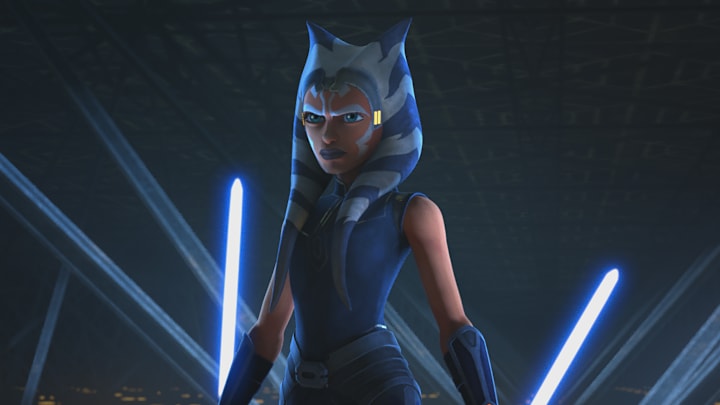While many of us may have purposefully forgotten much of the year 2020, the end of Star Wars: The Clone Wars is one of few highlights that remain fresh in our minds even five years later.
The seventh and final season of the show premiered on Disney+ on February 21, and played out over 12 episodes divided into three four-episode story arcs. The final arc, collectively reffered to as The Siege of Mandalore, ended -- along with the series -- on May 4, 2020.
These four episodes -- "Old Friends Not Forgotten," "The Phantom Apprentice," "Shattered," and "Victory and Death" -- are so unique and cinematic that many fans consider them almost like a movie. Star Wars Celebration 2022 even hosted a Siege of Mandalore panel that began with a showing of all four episodes played in a row for a very large audience. Dave Filoni was there. We all cried.
Rewatching this arc again recently, I found myself distraught over the realization that something like this -- the conclusion of Ahsoka Tano's Clone Wars story woven in with the devastating aftermath of Order 66 -- very well might be the last of its kind, at least where Star Wars is concerned. It was the end of an era in two ways: The end of The Clone Wars, and possibly the final time we'll see years of animated storytelling wrap up in such a beautiful, emotional, and earned way.
I don't have ill feelings toward most of the Star Wars we've gotten since The Clone Wars ended. But I do often find myself yearning for the days when small-screen storytelling was both artistically longform and deliberately slow. Some of the best episodes of Star Wars TV we've ever gotten have happened because character growth needed to take precedent over plot. Some weeks, the story almost needed to pause so that certain characters had the chance to inch closer toward their final arcs at the end of their stories. And there was nothing wrong with that. It was so often well done. "Trials of the Darksaber" from Season 3 of Star Wars Rebels is a really good example of this effect.
The closest thing we've gotten since 2020 is The Bad Batch, which miraculously got to stretch out to three seasons. Listening to Tech confess his difficulties with connecting and communicating effectively with others was a powerful, unforgettable moment.
I fear these instances will arise less and less, especially in Star Wars animation, in the five years to come. It's no industry secret that streaming has hit a wall with no clear solution to its problems. Lucasfilm, over the last five years, has largely turned to a profit over purpose mentality when it comes to Star Wars TV. There have been some exceptions along the way. For the most part, though, there has been a clear refusal to divert from an established formula. Legacy characters at the forefront. No more than eight episodes per live-action season, unless you're Tony Gilroy. You're lucky if you get more than one season, unless you're Dave Filoni, who can seemingly do no wrong in the eyes of the decision-makers.
We may never again have our "Victory and Death" moment -- when it's Ahsoka's relationship with these characters over seven seasons that largely drives a collective emotional response to the story's sinister ending. Star Wars has, as recently as this weekend with Tales of the Underworld, proven that it can craft meaningful stories in a smaller number of episodes. But it's not the same as it was before. It likely never will be again.
What I long for most of all, perhaps, is the sense of being too naïve regarding the inner workings of the film and television industry to understand the things that are no longer possible. We will probably never get seven or even four or five seasons of an animated Star Wars show ever again, perhaps with the exception of Young Jedi Adventures, which gets a pass because children deserve Nubs and all associated and so much more. I could be wrong, and I hope I am. But the depth of Ahsoka's many character arcs in the series has thus, in a way, become a treasure we're lucky we were given.
The end of an era, sure. But maybe the beginning of something even better, if you'll allow me a moment of optimism in a time of uncertainty, even for the shows so many of us still love all these years later.
